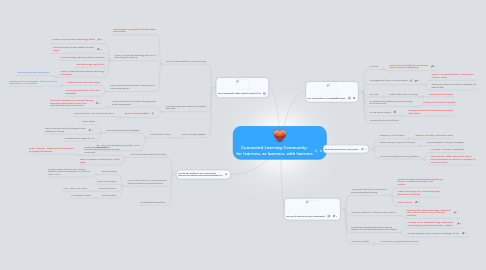
1. Our Community Adds Value for Each of Us
1.1. We act on what matters to our community.
1.1.1. Create digital surveys/polls to further define what matters.
1.1.2. Focus on improved technology and use of technology for learning.
1.1.2.1. Continue Project Success Technology Strand
1.1.2.2. Continue Project Success Teacher-Librarian Strand
1.1.2.3. Add Technology Learning monthly unmeeting
1.1.2.4. Add Technology "Book Club"
1.1.2.5. Support district and school-based technology committees.
1.1.2.5.1. Develop responsible use policies.
1.1.3. Improve access to information, resources, and community support.
1.1.3.1. Create one-stop information space
1.1.3.1.1. Develop how-to "one-pagers": what you need to know about....Post on portal.
1.1.3.2. Co-create personalized "must read" newsletters.
1.2. We create responsive networks to support each other.
1.2.1. Time to reflect and think with colleagues with similar assignments
1.2.1.1. Continue to develop IRP connected learning resources (online and at the DRC) and share/build with grade level teams.
1.2.2. Build a coaching network
1.2.2.1. Every event: who can coach us with this?
1.3. We are stronger together.
1.3.1. Participation matters.
1.3.1.1. Use/model participatory strategies.
1.3.1.1.1. Game design
1.3.1.1.2. Pechu Kucha and similar strategies at each meeting for sharing.
1.3.1.1.3. Unconference strategies for PD.
1.3.1.2. Ask - who is not participating and why. Act on information.
2. We are all Leaders in Our Community (We are the people we've been waiting for.)
2.1. We share the responsibility of leading.
2.1.1. Continually connect to the experts/coaches/mentors in our own community.
2.1.1.1. Foster "pairings": always include lead-learners to support new learners.
2.1.2. Build an inventory of strengths to "match make".
2.2. We use and connect our community and global networks to support and lead.
2.2.1. District partners
2.2.1.1. Project Success, Dept Heads, coaching network, District Coordinators, PVPs, ETAG, NDTA, NSAA
2.2.2. Community Partners
2.2.3. Provincial Partners
2.2.3.1. NOII, AESN, HSN, CEET
2.2.4. Global Partners
2.2.4.1. PLPNetwork, Twitter
2.3. We ask different questions.
3. Our Community is a Hospitable Space
3.1. We listen.
3.1.1. Commit to school walks to see and hear stories, concerns, celebrations.
3.2. We engage each other in conversations
3.2.1. Support "Conversations that Move Learners Forward" Series.
3.2.2. Share and practice conversation strategies: we walk the talk.
3.3. We invite.
3.3.1. Reflect often: who is missing?
3.3.1.1. Send personal invitations.
3.4. We respect the strengths each person brings to our community.
3.4.1. Develop an inventory of strengths.
3.5. We use sincere inquiry.
3.5.1. Develop processes for developing meaningful staff inquiry.
3.6. We are willing to be disturbed.
4. Sharing Anchors Our Community
4.1. Everyone is “in the know.”
4.1.1. Develop "one-stop" information space
4.2. Every meeting is a space for sharing.
4.2.1. Use unconference and game strategies.
4.3. We use technology as a sharing platform.
4.3.1. Co-create "must-read" newsletters
4.3.2. Use Facebook, Twitter, wiki, portal, blog to share information, our stories, our question, to connect our work.
5. We are all Learners in Our Community.
5.1. We provide tools for DIY, just-in-time, anytime/anywhere learning.
5.1.1. Provide a monthly technology sharing/learning session - crowdsource the topic; find coaches.
5.1.2. Create a technology DIY PD bookclub using Blackboard Collaborate.
5.1.3. Project Success
5.2. We learn “outloud” so others can learn with us.
5.2.1. Continue/add collaborative blogs, videos and other Web 2.0 tools for our PD learning portfolios.
5.3. We embrace playing/exploring/wondering together to learn what hasn’t been done before.
5.3.1. Continue our six-week technology "exploration" and sharing the play/wonder process. Extend!
5.3.2. Use game design and unconference strategies for PD.
5.4. We are all coaches
5.4.1. As we learn, we support newer learners.
